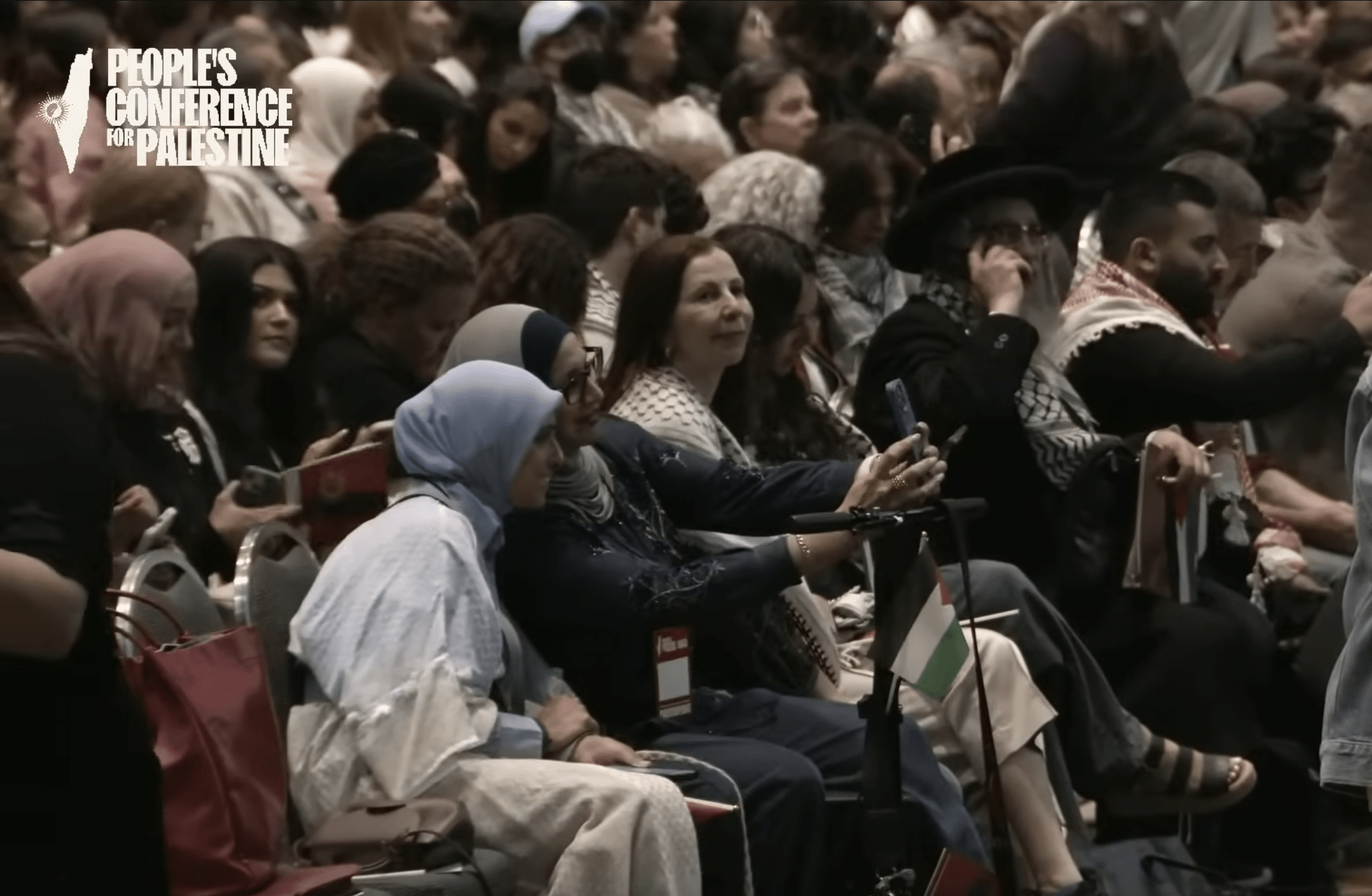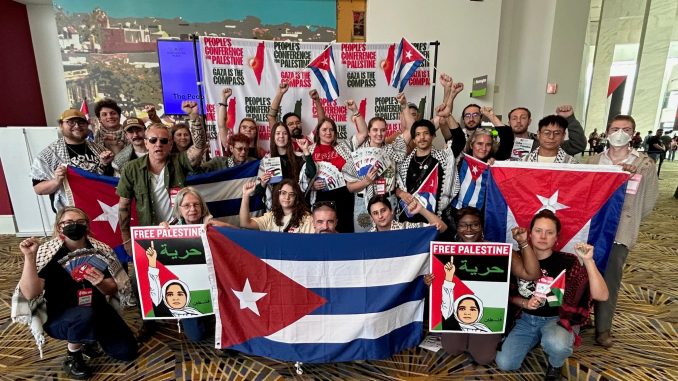
“Gaza is our compass. Gaza, a tiny strip of besieged land which has transformed into the center of the world. Gaza, whose bravery and courage in the face of total onslaught from the United States and Israel has revealed core injustices at the root of our current reality and has moved millions into action.”
These words opened the 2025 People’s Conference for Palestine. They are not only an introduction to the conference’s theme — Gaza is our compass — but also a summation of the historical moment in which the conference takes place.
The main events of the conference were held in a large hall that was named for Anas al-Sharif, a Palestinian journalist and videographer for Al Jazeera Arabic, who the U.S. and Israel assassinated in their airstrike on al-Shifa Hospital on Aug. 10, 2025, in Gaza City, 19 days before the opening of the conference.
“When Israel and the United States assassinated Anas, their goal was not simply to murder him,” said Taher of the Palestinian Youth Movement, the opening emcee. “They intended to cut Gaza off from the world, to break us from our center of gravity, to divide us from our compass. Our presence here today shows that this plan has been a total failure.”
Rama of the U.S. Palestinian Community Network, co-emcee of the conference, said, “By gathering in rooms named after martyrs and prisoners, we honor their sacrifices and we ensure their legacies continue.”
The convenors of this conference represent a broad section of the Palestine liberation movement in North America. For such a broad section, the political and ideological unity they displayed was militant and anti-imperialist: that the genocide in Palestine is U.S.-manufactured; that this genocide is a feature, not a bug, of the imperialist system; and that beyond stopping the genocide, we must also stop the system that profits from genocide.
United States the primary culprit behind Israel
Throughout the conference, speakers made it clear: Israel is nothing but a United States military base. The dog wags the tail, not the other way around.
For regular readers of Struggle-La Lucha, this may seem obvious or a given. The history is clear. SLL editor Gary Wilson, in an article titled “Scorched earth capitalism: U.S. imperialism’s genocide in Gaza,” wrote:
“U.S. support for Israel cannot be explained simply by the influence of AIPAC or by blackmail scandals surrounding figures like Jeffrey Epstein. It goes back more than a century, to Britain’s 1917 Balfour Declaration, when London endorsed a Zionist homeland in Palestine as a way to fragment Arab unity. After 1948, the United States inherited this role, seizing upon Zionism as a means of dividing and suppressing the Arab world.”
In a workshop session titled “Unmasking Genocide Enablers in the United States,” multiple speakers echoed this position.
One speaker remarked at the beginning of their talk: “It’s not as if AIPAC didn’t exist, the genocide wouldn’t be happening.” Ultimately, it is U.S. war profiteers and their federal government who would keep it afloat.
Former U.S. President Biden freely admitted in a 1986 session of the U.S. Senate: “Were there not an Israel, the United States of America would have to invent an Israel to protect her interests in the region.” Of course, this does not rule out mass struggle against AIPAC.
Another speaker in this session opened with some conventional wisdom: “If you want to know someone’s secrets, check their laundry. Israel does not do their own laundry. They send it to Washington.” They then referenced one of Netanyahu’s visits to Washington, in which he and his family really did bring their laundry to be done in the United States.

The two-way arms embargo
Another major call of the conference is to fight for two-way arms embargoes on Israel — the two ways being both exports to and imports from the Zionist occupation.
Besides embargoes between governments, the conference calls for people’s arms embargoes, in which communities and workers mobilize to block weapons shipments to Israel.
The panel titled “No Weapons for Genocide: the People Demand an Arms Embargo,” which deserves its own report, described just how fragile the supply chain to Israel is, specifically the supply chain to build F-35 fighter jets.
Aisha of the Palestinian Youth Movement, in an explanation of the Mask Off Maersk campaign, described: “The F-35 supply chain functions off of this ‘just-in-time’ logistics process. It’s an inventory management system, and it’s called ‘just in time,’ which means that it delivers the goods right before they’re needed. So, what I’m saying to y’all is that if one specific node of the F-35 supply chain is intervened in, it has a huge impact on our people back home.”
Our responsibility in North America
“Where to now for the movement for Palestinian liberation in North America?” asked Lubna of the Palestinian Feminist Collective during the panel titled “The Struggle Continues: the Fight for Palestine in North America.”
“First, we turn to our beautiful people in Gaza who, over the course of history, but especially the last two years, have risen from the rubble time and again to teach us lessons in honesty, courage, and resistance.”
Throughout the conference, speakers and participants consistently reaffirmed that we here in the heart of the empire have a particular responsibility, whether Palestinian or Arab diaspora or not.
“I want to offer three core tasks that I see us having specifically as the North American movement for Palestine right now,” said Jemma of Jewish Voice for Peace. “The first and foremost, which I’ll return to in a moment, is to do everything we can to immediately stop the genocide and find those levers that can do so most effectively.
“We also need to be defending our people and our communities here against rising authoritarianism and fascism in ways that continue to forge across movements in real ways, that embed Palestine, that build relationships and understand that shared stake.
“And the third is to build durable movements for the long haul that are both wide and deep that are really oriented towards scaling up at new levels.”
Speakers and participants also reaffirmed throughout the conference that the movement to free Palestine must escalate.
The revolutionary left
The revolutionary left in North America must take the lessons of the conference back to their organizations and local struggles. We must remain scientific in our analysis of the situation because of what it means for our strategy.
The best thing we can do for Palestine is to win our revolution.
Make no mistake: It is the people of Gaza who will free Gaza. It is the people of Palestine who will free Palestine. But because we are here in the heart of the empire that is conducting the genocide, there is much we can do to smooth the way for Palestine’s victory.
Join the Struggle-La Lucha Telegram channel
